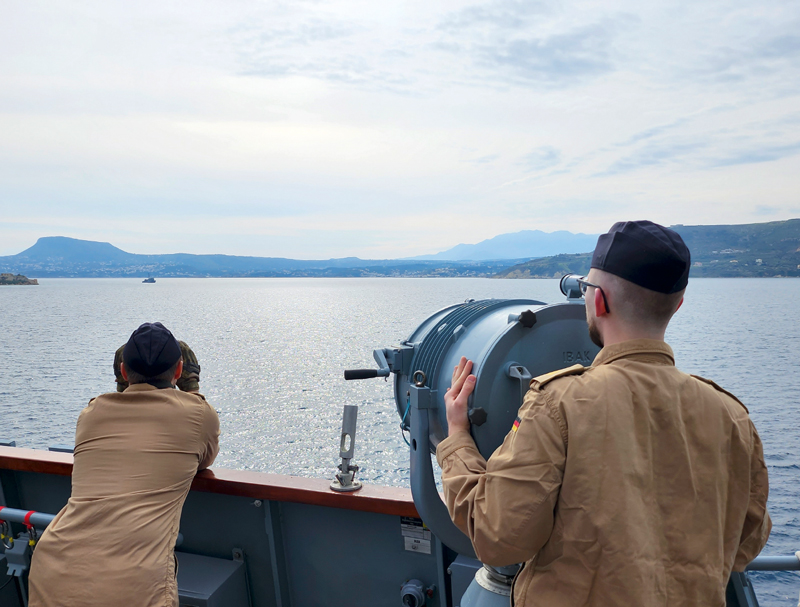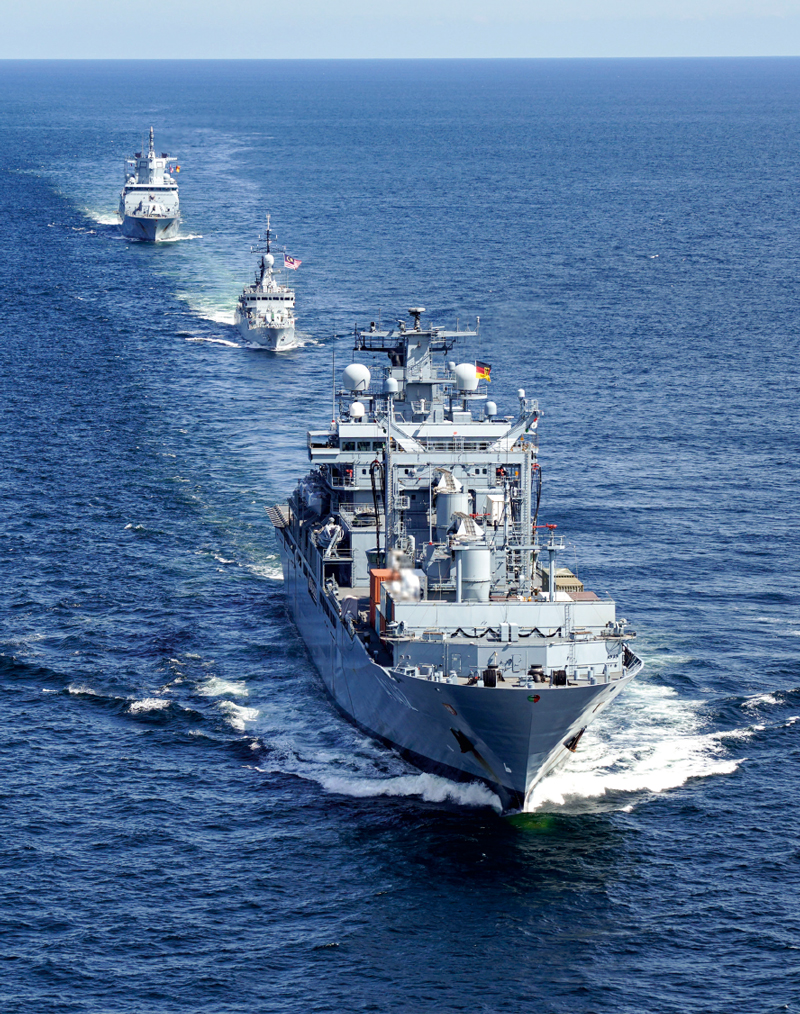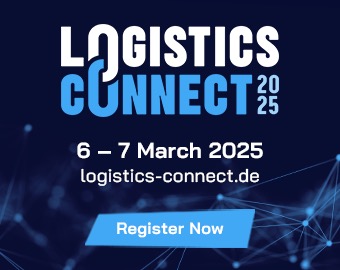The maritime industry is facing major challenges, and not only with regard to the energy transition and the transformation to a climate-neutral economy. Market players also have to contend with geopolitical conflicts and cyberattacks. Experts from the Kiel Institute for the World Economy, the Association of German Seaport Operators, the Fraunhofer Centre for Maritime Logistics and Services and the German Maritime Institute view this explosive cocktail from their respective standpoints – and have various ideas for cooperation.
He identifies, among other things, the latest developments in the USA, particularly the Trump administration’s tariff policy, and the Middle East conflict as key factors in this. “With its current policy, the USA is a hotbed of uncertainty,” he states. He believes that, in such situations, global trade usually reacts cautiously and postpones planned innovations and investments. For the shipping industry, this usually means less business, less cargo on board the ships and, in turn, a fall in demand and less income. “It’s up to Europe to chart the right course here,” Hinz advises, implying we should make a virtue out of necessity. “It’s true that Europe does ten per cent of its trade with the USA, which certainly isn’t a small amount. At the same time, though, a market share of 90 per cent and many partners around the globe who pursue similar economic interests to those of Germany and Europe as export nations are out there.” The task now is to conclude, finalise or modernise further trade agreements with these nations. Indeed, Hinz is shifting his focus partly to the OECD countries, particularly Canada and Australia. Likewise, the agreement between the EU and the Mercosur countries, signed in December 2024 after almost 25 years of negotiations, must be ratified quickly by all member states.
Uncertainty is not helpful
Daniel Hosseus, Managing Director of the Association of German Seaport Operators (ZDS), also assumes that current US policy could have an adverse impact on the economy and international trade policy. “The uncertainty sown by the American government – whether in Greenland, Panama, the Suez Canal or elsewhere – isn’t helpful,” he says, “nor are the announcements of new tariffs. They’re shooting themselves in the foot, as they now also risk being hit by tariffs. After all, they want to sell their products and services on the European market, too.” This is why he hopes that the EU will present a strong, united front in the trade dispute and implies possible trade substitution effects. “It remains to be seen whether Trump’s actions will actually lead to less freight traffic or whether goods will just find other routes. This doesn’t necessarily have to be a bad thing for the European and German economy,” Hosseus predicts.
However, Hosseus does see a need for politics to get involved when it comes to improving infrastructure and suprastructure in the ports. “The energy transition and these changing times demand huge investments quickly, which the federal states and industry can’t provide.” Billions in investments are needed every year, also due to the new requirements placed on the ports by the government. Consequently, significantly more money must flow into the system. “Germany is the third-largest economy in the world,” he adds, emphasising what he considers to be the prominent role of the country’s ports. “The majority of our foreign trade is transported by sea. Moreover, the ports are not only an important basis for prosperity and security in Germany, they also support change throughout our country. The government must be involved in this.”
“Even the bad guys are getting better and better”
Professor Carlos Jahn, Head of the Fraunhofer Centre for Maritime Logistics and Services (CML) in Hamburg, has a plausible explanation for why maritime structures and ports are particularly vulnerable to cyberattacks in these difficult times. “They’re complex systems in which a large number of different parties are interconnected to a very high degree,” he explains. Plus, many different modern and older systems interact within these structures, which create gateways for such attacks, especially at the interfaces. “The main risks are in accessing routing systems, inventory and customer records, but also in the loss or blocking of sensitive company data,” he continues, outlining the breadth of the risk spectrum.
In this context, Jahn has identified that there is not only a growing number of cyberattacks on ports, maritime facilities and ships, but these criminal acts are also increasing in quality. “Even the bad guys are getting better and better,” he concedes, without wishing to downplay the seriousness of the situation. He makes this point to emphasise that both sides are in constant competition – the “good guys” are working to make systems more secure, while the “bad guys” are trying to identify and exploit their weak spots.

“Cooperation between the German ports works very well.”
Managing Director of ZDS

“With its current policy, the USA is a hotbed of uncertainty.”
Prof. Julian Hinz, Head of the Research Center Trade Policy at the IfW Kiel
He considers regular testing and updates, raising employee awareness, ongoing training and dialogue between all parties involved in ports and logistics to be important IT security safeguards. “Nothing’s perfect, there’s always room for improvement. It can’t hurt if those affected share what they know and talk openly about cyber issues,” states Jahn. In light of this, he acknowledges that companies within the industry have taken a significant step towards greater transparency in recent years and that incidents of this kind are rarely swept under the carpet any more. Furthermore, the ports are really well prepared. This is proven, for example, by the fact that ports such as Hamburg, Bremerhaven and Cuxhaven are hit by cyberattacks multiple times every week, but only a fraction of them are successful. “This is good, but every successful attack is one too many,” he concludes.


“It is precisely at interfaces where the gateways for cyberattacks arise.”
Prof. Carlos Jahn, Head of Fraunhofer CML
Dependence on functioning maritime structures
Karsten Schneider, retired rear admiral and president of the German Maritime Institute (DMI), also emphasises the great importance of the sea routes and, in turn, of German ports. “We mustn’t forget that Europe is a peninsula and that a large part of our supply, communication and economic performance is carried out on or under the water,” he explains. Schneider not only has global shipping in mind here, he is also highlighting the importance of undersea cables, pipelines, offshore wind farms and offshore oil production. “The wider public doesn’t often recognise this, but we’re highly dependent on the smooth functioning of maritime structures,” he continues. “The extent of this has been shown not only by the ‘Ever Given’ accident in the Suez Canal and its consequences for supply chains. Recent acts of sabotage against data and power cables in the Baltic Sea serve as further proof.”

“So far, the existing system has always managed to cope with such threats somehow – for example, by sailing around certain regions or switching to other modes of transport,” Schneider ascertains, both in view of the current geopolitical developments in the Red Sea and the South China Sea and the pirate attacks in the Strait of Malacca. “However, if there were to be a deliberate increase in such incidents on a larger scale, things could become difficult.” He also addresses cybercrime. “Digitalisation is a key prerequisite for ensuring that the maritime industry and logistics remain modern and efficient,” he continues. “How-ever, their growing importance means they’re also increasingly becoming a target for cybercriminals.”
In terms of coordination between the responsible maritime authorities, Schneider sees considerable potential for improvement in a crisis. “We’re dealing with a completely new form of hybrid warfare today,” he states. “It’s a conflict with a hostile, foreign power that’s constantly attacking us just below the NATO alliance threshold. In peacetime, which is what we officially have right now, the Bundeswehr can only provide administrative assistance without executive authority.” The enemy exploits the boundaries between the responsibilities of law enforcement and the armed forces skilfully by overburdening the police but not doing enough to trigger military involvement. “This is the crux of the problem,” explains Schneider. “We’ve not made any progress on the Maritime Security Act for two decades now. Such a law would give the navy greater scope for action in peacetime without taking on police duties. This would be a major step without having to intervene substantially in the constitutional separation of law enforcement and the military.” (bre)

“So far, the existing system has always been able to cope with such threats.”
Karsten Schneider, retired rear admiral
and president of the DMI.






